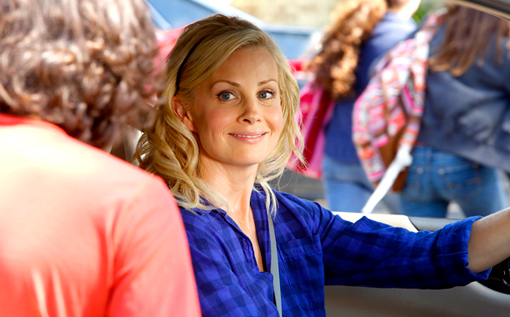What is refreshing about motherhood on TV is the spectrum of decision-making and priorities it represents; there is no singular June Cleaver model from which everything else deviates.
Confession: I still watch Grey’s Anatomy. Not for the on-call room bed-hopping or the weep-worthy crisis of the week, or the seemingly endless parade of bomb squads, plane crashes, and mass murderers that plague the doctors of Grey Sloan Memorial ne Seattle Grace Hospital. I watch Grey’s because I still enjoy, all these years later, watching, as Alexis Stephens put it, “Meredith as she learns how to be a better mom than her own.” I still enjoy watching her and Christina figure out how to be there for each other as their personal and professional priorities change. I still enjoy watching Derek and Meredith navigate this next chapter in their marriage. I still care how it all turns out for these people. While their medical melodrama jumped the shark long ago, the character evolution of this core group still feels as real as ever.
But it’s not just the sheer pleasure of interpersonal storytelling that makes Grey’s important in a TV landscape dominated by boy kings and philandering detectives. Nine million people tune in to Grey’s each week and it’s not for the gore of lawn mower accidents. Nine million people watched Callie and Arizona build a family that loves and struggles just like any other. Nine million people watched Christina terminate the pregnancy she insisted all along she didn’t want. Nine million people watch a cast that is more than 50% people of color, where interracial relationships are frequent and neither sexed-up nor oversimplified.
Does the Internet get a little overzealous about television commentary from time to time? Sure, and I’m as guilty as the next worked-up Game of Thrones fan. Do the narrative arcs of True Detective or Breaking Bad warrant the column inches, front-page headlines, and fluffy think pieces (like the one you’re currently reading)? No, probably not. As a friend recently pointed out, comparing the outcry over the How I Met Your Mother finale to the outcry over the 200 kidnapped Nigerian schoolgirls should make us all think twice before we post our “outrage” over plot twists and spoilers to the web.
But does TV offer us something of value besides a way to kick back and disengage? I think it does.
In the age of “news” that comes funneled through our personalized feeds, TV still grabs the masses better than anything else. Whether it’s Survivor or Real Housewives or Modern Family, it can create a common vocabulary for swaths of America that are barely sharing any vocabulary at all. Twenty times more people watch Grey’s Anatomy than read New York Magazine. Which does more work, another essay about “having it all” or the visible tension between Christina and Mer when they see the tangible effects of their differing paths?
TV becomes a foot in the door, or rather a screen in the living room, for the kinds of conversations that might not otherwise find space to breathe. Conversations, say, about motherhood, and what it can and should look like.
On The AV Club, Libby Hill complained that Leslie’s pregnancy on Parks and Recreation contributes to the idea that the dramatic arc of female characters is incomplete until they become moms. Although I absolutely agree that suggesting women are incomplete without a baby on the hip is deeply insulting, over 80% of women will become mothers someday, so it’s not unrealistic to build that milestone into most stories. Motherhood is only a reductive plot decision if it comes at the expense of everything else that a character is.
What is refreshing about motherhood on TV at the moment is the spectrum of decision-making and priorities it represents; there is no singular June Cleaver model from which everything else deviates. When I polled Facebook for best and worst in class, Cersei’s power-hungry mother lion and Betty Draper’s petty, pouting princess were collectively placed on the Yikes end of the scale. The Braverman women of Parenthood, especially Kristina and Camille, got high marks, as did the historical holy grails of Clair Huxtable and Tami Taylor. And then there were the few, the complicated, who received mixed marks, call that Camp Skylar White.
People in my circles of the web love to argue about what is or isn’t feminist (ahem, Claire Underwood), and TV is no exception. But where I land time and time again is that each individual character’s decision tree matters less than what we see when we step back and look at the big picture. You know those kitschy posters of Lincoln made up of a million mini pictures of Lincoln? Imagine each TV mom as one tiny swatch; when we step back, what picture are we building? That’s what I care about.
I want the collective portrait of motherhood to be multi-colored, multi-textured, and multi-patterned. It includes the women who became mothers without ever really wanting to be, like Mona and Margaret on this week’s Mad Men. It includes adoptive parents, like Lena and Stef on The Fosters, and stepparents like Kate on Trophy Wife. It includes the women who wear motherhood like a cape and those who struggle to reconcile their goals and ambitions with their responsibilities at home.
So to all of them, and all of you, Happy Mother’s Day! Now turn off the TV and go give your mom a hug.
Role Reboot regular contributor Emily Heist Moss is a New Englander in love with Chicago, where she works in a tech start-up. She blogs every day about gender, media, politics and sex at Rosie Says, and has written for Jezebel, The Frisky, The Huffington Post and The Good Men Project. Find her on Facebook and Twitter.
Related Links:

